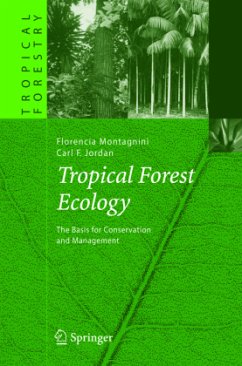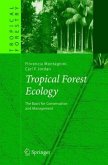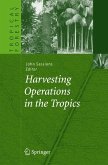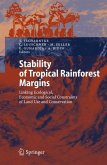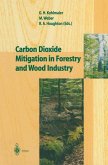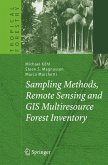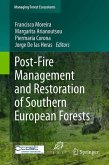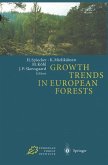Research in tropical forestry is confronted with the task of finding strategies to alleviate pressure on remaining forests, and techniques to enhance forest regeneration and restore abandoned lands, using productive alternatives that can be attractive to local human populations. In addition, sustainable forestry in tropical countries must be supported by adequate policies to promote and maintain specific activities at local and regional scales.
Here, a multi-disciplinary approach is presented, to better the understanding of tropical forest ecology, as a necessary step in developing adequate strategies for conservation and management. The authors have long experience in both academic and practical matters related to tropical forest ecology and management.
Hinweis: Dieser Artikel kann nur an eine deutsche Lieferadresse ausgeliefert werden.
Here, a multi-disciplinary approach is presented, to better the understanding of tropical forest ecology, as a necessary step in developing adequate strategies for conservation and management. The authors have long experience in both academic and practical matters related to tropical forest ecology and management.
Hinweis: Dieser Artikel kann nur an eine deutsche Lieferadresse ausgeliefert werden.
Aus den Rezensionen: "Es handelt sich bei dieser Publikation um einen modernen, inhaltsreichen und sehr gut strukturierten Text ... Das weit reichende Thema auf weniger als 300 Seiten zu behandeln, stellt eine grosse Herausforderung dar. In den meisten Fällen ist es den Autoren gelungen, den Stoff ... sehr informativ zu verarbeiten und attraktiv zu gestalten. ... Die Kombination von ökologischen, ökonomischen und zum Teil auch politischen Überlegungen macht das Buch zu einem nützlichen Referenz ..." (FRANZ SCHMITHUSEN, JEAN-PIERRE SORG, in: Schweizerische Zeitschrift für Forstwesen, 2006, Vol. 157, Issue 6, S. 232)
From the reviews:
"As tropical forests might be particularly susceptible to (human) disturbances it is very much appreciated that the results have been bundled into a book which gives an overview about the subject. ... the book is suited for a wide array of students with either a forestry, biology or environmental background. The list of references shows a good representation of up to date literature ... . the book can be recommended for those readers with an interest of tropical forest ecology ... ." (Paul Keßler, Blumea, Vol. 51 (1) 2006)
"This is a much needed textbook on the causes of tropical deforestation and the forestry techniques needed for management and restoration. ... This book will be a useful management resource for foresters or a supplementary text for those studying tropical rainforest ecology." (Southeastern Naturalist, Vol. 5 (3), 2006)
"The book consists of 8 chapters. ... In summary, the authors succeeded in presenting a comprehensive overview on tropical forest ecology, reflecting the authors' extensive experience with the topic. ... is illustrated with many tables, figures and photos. ... is well-organized, e.g. specific information and case studies are presented in separate text boxes. ... valuable to anyone who needs a thorough and readable synthesis of tropical forest ecology and an overview of adequate management systems." (Luitgard Schwendenmann, Phytocoenologia, Vol. 38 (1-2), August, 2008)
"The purposes of the book by Montagnini and Jordan are 'to bring together and examine evidence that bears on the question of the uniqueness of tropical ecosystems', to find answers to the question of inherent ecosystem fragility and draw conclusions for forest management. ... The view point is North-American which for a more Eastern reader creates ... interesting insights. The many examples are well presented, often in boxes; the choice of mostly recent literature is rather selective; the subjectindex is helpful ... ." (Eberhard F. Bruenig, International Forestry Review, Vol. 7 (4), December, 2005)
"As tropical forests might be particularly susceptible to (human) disturbances it is very much appreciated that the results have been bundled into a book which gives an overview about the subject. ... the book is suited for a wide array of students with either a forestry, biology or environmental background. The list of references shows a good representation of up to date literature ... . the book can be recommended for those readers with an interest of tropical forest ecology ... ." (Paul Keßler, Blumea, Vol. 51 (1) 2006)
"This is a much needed textbook on the causes of tropical deforestation and the forestry techniques needed for management and restoration. ... This book will be a useful management resource for foresters or a supplementary text for those studying tropical rainforest ecology." (Southeastern Naturalist, Vol. 5 (3), 2006)
"The book consists of 8 chapters. ... In summary, the authors succeeded in presenting a comprehensive overview on tropical forest ecology, reflecting the authors' extensive experience with the topic. ... is illustrated with many tables, figures and photos. ... is well-organized, e.g. specific information and case studies are presented in separate text boxes. ... valuable to anyone who needs a thorough and readable synthesis of tropical forest ecology and an overview of adequate management systems." (Luitgard Schwendenmann, Phytocoenologia, Vol. 38 (1-2), August, 2008)
"The purposes of the book by Montagnini and Jordan are 'to bring together and examine evidence that bears on the question of the uniqueness of tropical ecosystems', to find answers to the question of inherent ecosystem fragility and draw conclusions for forest management. ... The view point is North-American which for a more Eastern reader creates ... interesting insights. The many examples are well presented, often in boxes; the choice of mostly recent literature is rather selective; the subjectindex is helpful ... ." (Eberhard F. Bruenig, International Forestry Review, Vol. 7 (4), December, 2005)

